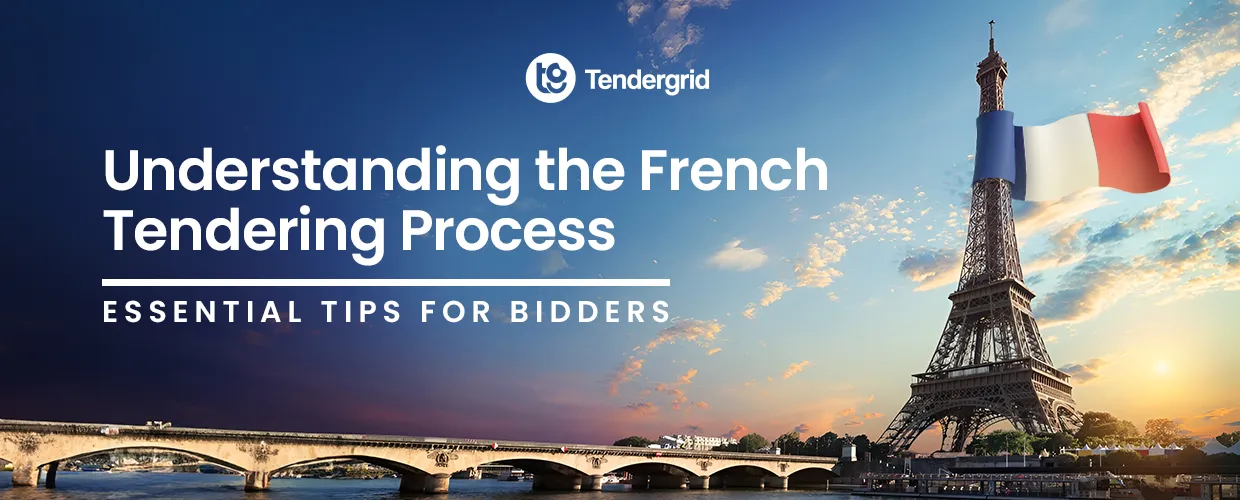INTRODUCTION
The tendering process in France is important for businesses. Entities who want to secure tender contracts in public and private sectors related to global tenders must have complete knowledge about the tender process. The systematic tendering process helps bidders to submit detailed and competitive proposals for various projects and services, ensuring transparency and fair competition.
Having a thorough understanding of the process related to France Tenders is crucial, as it can greatly impact the chances of success. Knowledge about specific tender requirements and related regulations sets a difference between winning a contract and missing out.
In France, the process starts with a tender notice also known as the Notice of Public Call for Competition (AAPC), that outlines the requirements for submitting a proposal. Bidders must prepare their submissions carefully, ensuring they meet all the legal, financial, and technical criteria, mentioned in the notice.
In this blog, Tender Grid has laid down the details about key aspects of the French Tendering process and what tips to follow for achieving success in a tender process.
EXPLORING THE FRENCH TENDERING LANDSCAPE
- The French tendering process is aimed at providing a systematic approach for both public and private organizations to invite suppliers to submit proposals for various projects and services. Applying for France Tenders typically starts with a tender notice, which outlines the project’s goals, requirements, and submission guidelines. Bidders must prepare their proposals carefully to ensure they meet all necessary legal, financial, and technical standards.
- One key distinction between public and private tenders is their transparency and governance. Public Procurements are subject to strict legal regulations that promote fairness and transparency, which means they require detailed documentation and often extensive evaluation processes. These tenders are open to a broad range of suppliers, creating a competitive environment. In contrast, private tenders allow for more flexibility, in terms of requirements and evaluation criteria.
- Organizations can tailor their requirements, evaluation criteria, and other specific needs, which can lead to quicker decisions but can also limit competition. The France Tenders process is guided by the Public Procurement Code, which is aimed at ensuring transparency and efficient use of public funds.
- Understanding these rules and regulations is vital for bidders who want to explore the French Tendering landscape successfully.
KEY STEPS IN FRANCE TENDER PROCESS
1. Preparation Stage: Setting the Foundation
- The preparation stage is vital for putting together a winning bid. Begin by exploring opportunities through platforms related to France Tenders, such as Tender Grid which is a Global Tenders Portal. These resources provide access to a wide variety of tender notices, allowing you to find projects that match your business’s strengths and expertise.
- Once you identify potential France tenders, take time to understand the eligibility criteria and specific requirements outlined in each notice. This will ensure you understand the requirements of the tender project and can assess whether your organization meets the necessary qualifications or not.
2. Bid Submission: Making Your Proposal Shine
- When it’s time to submit your bid, adherence to guidelines and deadlines is essential. Pay close attention to each tender notice. The Notice of Public Call for Competition (AAPC), provided by the French Government includes details about deadlines and specific guidelines related to the submission of your proposal, failing which can lead to disqualification. Make sure to prepare the required documents for France Tenders, which include technical proposals, and financial statements, ensuring they meet the stated criteria.
- It is also important to adhere to the required formats. Whether it’s a digital or printed submission, a well-organized, professional submission not only shows your commitment but also increases your chances of standing out in a competitive field.
3. Evaluation and Award: Navigating the Final Stage
- After bids are submitted, the evaluation process begins. Evaluators assess each proposal based on specific criteria, including price, quality, technical merit, and experience. Compliance with all submission requirements stated in AAPC for tender projects is vital, as any oversights can negatively affect your score.
- Understanding the evaluation process allows you to tailor your proposal accordingly to highlight your strengths.
- Successfully navigating this final stage can lead to winning the contract, marking a significant achievement in your bidding journey.
ESSENTIAL TIPS FOR BIDDERS
1. Read Tender Documents Carefully
One of the most important steps in the bidding process related to France Tenders is reviewing all the tender documents. Understanding the terms and conditions is essential, as these details outline project requirements, deadlines, and evaluation criteria.
2. Focus on Clarity and Conciseness
During writing your proposal, clarity and conciseness should be your guiding principles. Use simple language that everyone can understand, and avoid using complex jargon. Organize your proposal logically, highlighting headings and bullet points.
Bullet points and headings can enhance readability, allowing evaluators to quickly grasp the essential information.
3. Balance Quality and Cost
It’s important to be competitive with your pricing while ensuring high quality. Focus on delivering value that aligns with the project’s needs. Highlight how your proposal offers great value while maintaining high standards.
This balance can set your proposal apart.
4. Build Relationships
Networking plays a significant role in the bidding process. Making relationships with national and international entities can give you valuable insights into upcoming projects and enhance your reputation.
Attend industry events and engage with key contacts to strengthen your connections, to make yourself a more appropriate company for future tenders.
CONCLUSION
To summarize, understanding the French Tendering process is crucial for bidders aiming to secure valuable contracts. As a bidder, familiarizing yourself with the specific requirements, regulations, and evaluation criteria can significantly improve your chances of winning bids. Staying updated through platforms related to France Tenders and the Global Tenders further enhances your ability to navigate the tendering process effectively. Embrace the tools and insights to position your business for success in the ever-evolving world of tendering.
By utilizing proper resources and understanding the key aspects of France Tenders, bidders can significantly enhance their bidding strategies, and by following the essential tips they can successfully win valuable France Tenders.
If you are looking to move forward with the Global Tenders or specifically France Tenders, then Tender Grid is the right tool for you. It is a Global Tenders Portal designed specifically for bidders, helping businesses quickly find opportunities that match their skills and expertise.
By using the services and insights offered by Tender Grid, bidders can easily navigate the tendering landscape and improve their proposal strategies.

